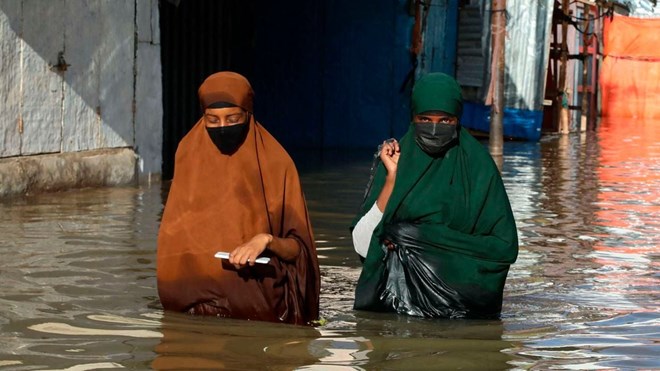
By VINCENT OWINO
Sunday September 3, 2023

Women walk through floodwater in Beledweyne, central Somalia, on May 12, 2023. PHOTO | HASSAN ALI ELMI | AFP
Conflict-prone countries like South Sudan, Somalia and the Democratic Republic of Congo (DRC) are feeling a greater economic impact of climate-related calamities, making it harder for them to bounce back from such catastrophes.
A new study by the International Monetary Fund (IMF) shows that the magnitude of drawbacks suffered by these countries after climate-related events is far worse compared to their peaceful peers.
The countries in this group – which also include Ethiopia, Sudan, Zimbabwe and Cameroon –are currently affected by violent conflicts, have fragile institutions or are prone to clashes.
The analysis shows that their GDP cumulatively drops by over four percent three years after the calamities, while their peaceful neighbours only suffer a one percent decrease.
The incomes of their citizens also take a bigger hit over the long term, as their GDP per capita falls by at least 0.2 percent after every such calamity, a phenomenon not observed among peaceful peers.
These further exacerbate their existing vulnerabilities that include conflict and hunger, creating a vicious cycle of never-ending problems. This makes it harder for them to address both the climate calamities and the conflicts, the study says.
“The more harmful effect of climate events in fragile states is not only because of their geographical location in hotter parts of the planet, but also because of conflict, dependence on rain-fed agriculture and lower capacity to manage risks,” the study says.
“Conflict undermines the capacity of fragile states to manage climate risks. For example, in Somalia, the area's most severely affected by food insecurity and hunger due to the prolonged drought in 2021-22 were under the control of terrorist groups that thwarted delivery of humanitarian assistance.”
The study also notes that conflicts worsen the agricultural yield, heightens inflationary pressures and further increases external liabilities.
In South Sudan, for instance, the Aweil irrigation scheme in the northern parts of the country has completely been neglected after the country’s second civil war, reducing food production and putting a strain on prices.
A similar situation has been experienced in the DRC, where conflict-related interferences drove away a potential investment that could have turned around the country’s ailing palm farming industry, the report says.
According to the study, the higher loss in economic output in these fragile states is because of such interferences with normal economic activity and destruction of critical productive infrastructure, reduction of agricultural yields due to destruction of crops and livestock, as well as the diversion of resources towards reconstruction.
As a result, consumption and investments remain low for years in these countries, while their exports drop dramatically after any climate-related calamity, which further widens their trade deficits and puts more pressure on foreign exchange.
Over the long term, conflict prone countries suffer more hits in productivity of land and labour, hence the reduced incomes for their citizens, pushing them further into poverty and widening inequality.
IMF estimates that by 2060, death from conflicts in these countries could increase by about 10 percent and 50 million more people will be pushed into hunger if the situation remains the same.
Mr Selassie and Jihad Azour, IMF’s director for the Middle East and Central Asia division, say in the blog that the right economic policy mix could help strengthen the economies of the fragile nations and improve their resilience towards the climate shocks.
“Critical interventions include policies to facilitate immediate response to climate shocks, such as building buffers through more domestic revenues, lower public debt and deficits, and higher international reserves,” they said.
“Strengthening social safety nets and leveraging insurance schemes are also key to financing recovery in the case of catastrophic events.”